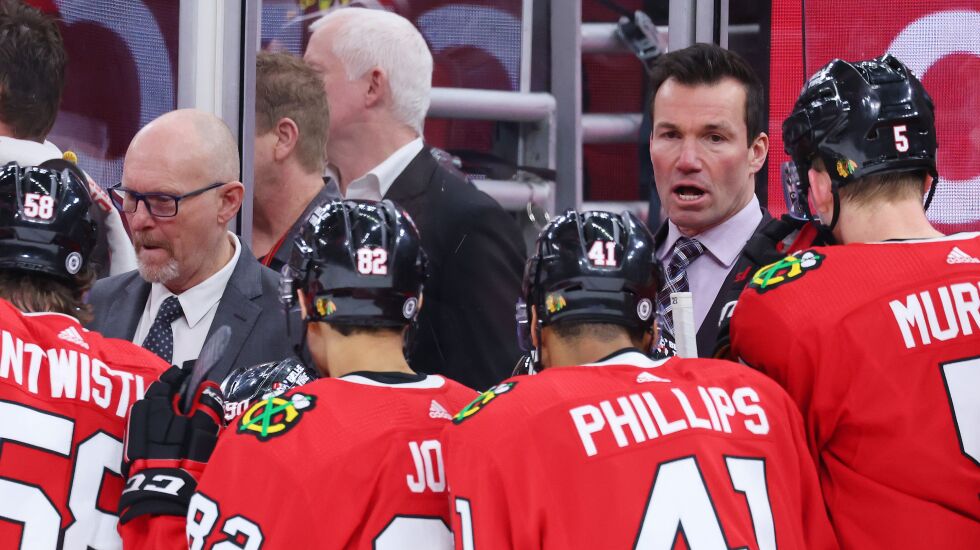
The NHL is a quieter league than it used to be.
That’s what Blackhawks coach Luke Richardson has claimed several times this season, noticing how much less talkative this generation of hockey players — and specifically the Hawks’ roster — is compared to previous generations.
“We’re a quiet team,” Richardson said. “I think most teams are quiet now. That’s just the nature of the young athlete. They’re intense, they’re in great shape, but they focus on one thing and they don’t use their voice as a tool. So we’re trying to use that as an extra tool on the ice for ourselves.”
Jack Johnson has observed the same thing. The 36-year-old defenseman, before being traded from the Hawks to Avalanche on Feb. 26, seconded the Hawks coach.
“A new generation is just different, right?” Johnson said. “No matter what you’re talking about, it’s going to be a little different. But they’re definitely more quiet in the room.”
One man to whom that blanket statement probably doesn’t apply is MacKenzie Entwistle.
The 23-year-old forward is arguably the Hawks’ chattiest player around the rink, setting an example that Richardson would surely like some of Entwistle’s compatriots to follow — with good reason.
“A lot of guys’ eyes are from guys’ voices,” Entwistle said. “Whether it’s off a faceoff, in the neutral zone or just knowing your routes and where you’re going, [talking makes things] more predictable. That’s what we want, right? That makes it easier to play.”
So if communication is so crucial, why does this generation struggle with it?
The most obvious potential answer is that young players are often less assertive and more hesitant to overstep their bounds — and thus talk less — and the league has simply gotten younger overall.
More and more prospects jump directly from juniors to the NHL, skipping the AHL, and more and more veterans struggle to land contracts, since studies have indicated peak performance actually occurs in mid- rather than late-20s.
“You see guys coming in at 18, 19, all the way up to 23 years old,” forward Colin Blackwell said. “Whereas maybe back when [Luke] played, there weren’t too many of those young, young players. Maybe it’s a little bit of comfortability and confidence.”
Added Johnson: “I know when I first came in, I was trying to seem ‘not there’ for all the right reasons — being respectful, being a young guy just trying to find a way in the league. Some of that might be playing into it. When the whole league is young, it just seems like the generation in general is quieter.”
The effect of social media, which might occupy players when they would otherwise have nothing to do but socialize, was also brought up.
“You go out to dinner and there’s less talking; guys are on their phones,” Johnson said. “I’ve seen teams where, instead of gathering up and going out and hanging out as a team somewhere as soon as you get into a road city, guys are hooking up their video games. It has definitely changed.”
And Richardson offered the most interesting, off-the-board idea, theorizing the lacking communication stems from how players are taught hockey as teenagers.
“They work on their individual skills and [communication] gets lost there,” he said. “It used to be you would go to a hockey school or work with a team and you’re talking. Your coaches are always preaching, ‘Call for the puck,’ or, ‘Call for a reverse.’
“Now it’s all about individual skill. That’s good, but you lose that team perspective of communication.”
In hopes of changing those subconscious habits, Richardson’s practice drills this season have often included verbal elements.
Even in simple passing drills with no defense involved, he wants players to get accustomed to calling out their teammates’ names when sending or receiving the puck. That instruction has sometimes been forgotten after a few reps, though.
“The first two guys call for it, and then after that, it gets quiet again,” he lamented.
With veterans like Johnson and McCabe — as well as Patrick Kane and, for the moment, captain Jonathan Toews — now gone, Richardson has challenged the remaining Hawks to step up leadership-wise.
And he has seen some of his newer players heeding that advice, such as Jason Dickinson on Monday against the Senators.
“I heard [Dickinson] barking up the middle for a pass, which our ‘D’ didn’t give him but should have,” Richardson said. “That’s a step forward for us — being a little more vocal, using that as a tool — and that was good leadership by ‘Dicky’ to do that.”
It might be a generational trend, but that means it’s still an even playing field league-wide. With Richardson’s focus on the subject, the Hawks will continue trying to break the overarching pattern.







